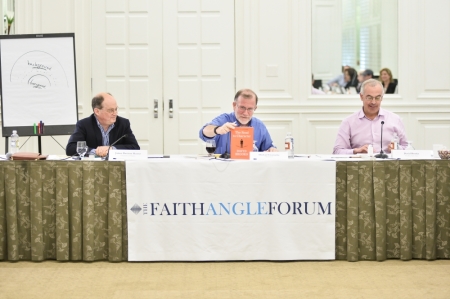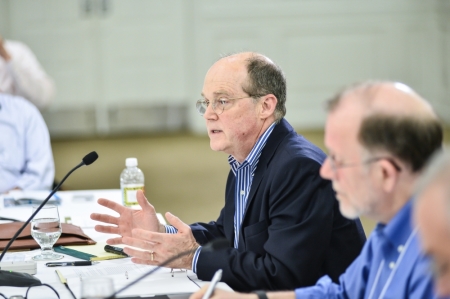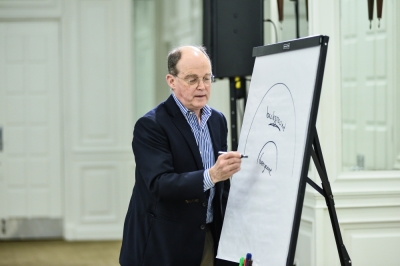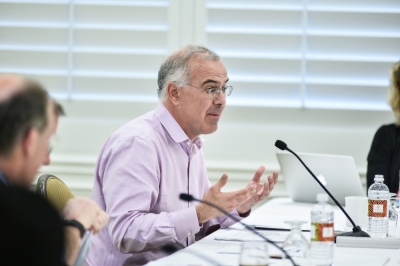Sex Assault Is Extension of Campus Culture, James Davison Hunter Says

MIAMI BEACH — The culture of college campuses contributes to their sexual assault problems, argued University of Virginia sociologist James Davison Hunter.
"The crime of sexual assault is an extreme, violent, and criminal extension of the very logic that plays out in the university and in late modern culture," Hunter said at a March Faith Angle Forum.
Hunter, LaBrosse-Levinson Distinguished Professor of Religion, Culture and Social Theory, was on a panel with New York Times columnist David Brooks discussing Brooks' recently published, The Road to Character.
In that book, Brooks discusses Americans' diminished capacity to talk about morality.
All of humankind, Brooks wrote, has two essential natures, what he calls "Adam I" and "Adam II." Adam I represents our outward accomplishments, what we put on our resume. Adam II represents our inner character, what is put on our tombstone. Our public life is unbalanced, Brooks believes, because Adam I has pushed aside Adam II.
Hunter's main critique of Brooks' argument was that he didn't go far enough — the problem goes much deeper than Brooks suggests. Our lack of a public language to discuss morality goes to the core of the nature of modernity, Hunter argued.

Unlike other animals, humans are "instinctually deprived," Hunter explained. Institutions serve humans by providing them with instinct-like tools.
"We humans, by contrast, don't know the things we need to survive; we are unfinished at birth. ... Institutions, which are merely deeply embedded patterns of thought, behavior, and relationship, are human constructions that provide for us what our biology does not. Institutions function like instincts, in that they pattern individual conduct and social relationship and our thinking in a habitual and socially-predictable manner," he said.

In our modern world, however, institutions have receded, meaning individuals now have more choices, and must make more decisions that were once made for them by institutions. That, by itself, is neither good nor bad. It's descriptive, Hunter says, but has both good and bad consequences.
Some of the negative consequences, Hunter believes, are highlighted in Brooks' book.
"What this means, is that the moral inarticulacy that David speaks of, and is not so much a function of moral failure or forgetfulness, but rather it is built into the very nature of the contemporary world," he said.
Morality becomes subjective. The narcisism in American culture that Brooks described, therefore, is the natural outgrowth of the decline of institutions, as Americans become consumed by those questions that institutions once provided for in an instinctual-like manner.
To illustrate his point, Hunter turned to the issue of sexual assault on college campuses.
Many universities have struggled with sexual assault issues in recent years.
At the University of Virginia, where Hunter teaches, a Rolling Stone cover story alleged a sexual assault at a UVA frat house. The story was later retracted and Rolling Stone apologized after discovering it was made up.
UVA was also among many universities investigated by the Department of Education's Office of Civil Rights for allegedly mishandling sexual assault investigations.
The American Association of University Professors and a group of 21 law professors, including Alan Dershowitz, have been critical of the Obama administration's directives to colleges and universities regarding sexual assault, arguing it has overstepped its authority.
And this week, Baylor University fired its president and football coach over a sexual assault scandal involving some of its football players.
Ultimately, Hunter believes, sexual assault issues on college campuses is not about mismanagment, but about cultural mores.
"At the heart of this culture and at the heart of sexual assault, is an implicit anthropology that conceives of human beings as objects for instrumental ends. When we see human beings as mere objects that have more or less utility, we cannot help but use them, consume them, instrumentalize them, in the ways that we consume, use, and instrumentalize other objects and experiences," Hunter argued.
One way higher ed "distinguishes itself," Hunter continued, "is in the refinement of this kind of instrumental rationality and practice."

This has three implications, according to Hunter: 1) sexual assault becomes an "extension of the logic" played out in universities, 2) a minimum standard becomes necessary, which is the language of consent, and 3) while "consent" seems simple and straightforward, it's actually complicated in practice and has "no clear application."
Brooks agreed.
"There is social chaos," Brooks said regarding the students he teaches at Yale. "Their social lives are anarchy and brutal."
You can listen to the audio or read the transcript at the Ethics and Public Policy Center website.





















